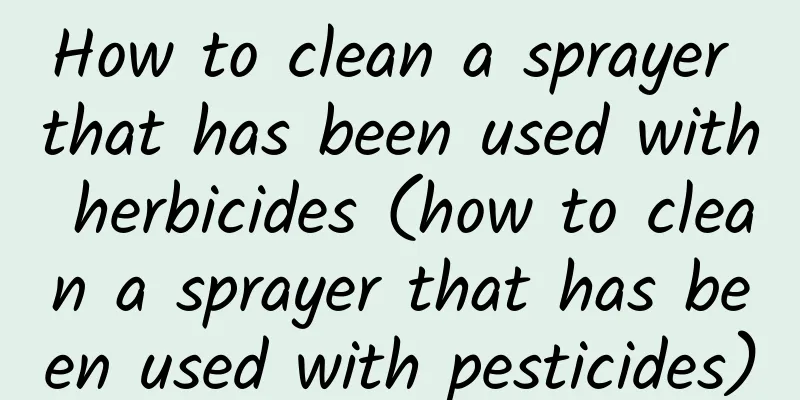How to clean a sprayer that has been used with herbicides (how to clean a sprayer that has been used with pesticides)

|
A netizen asked : I used a sprayer that had been used with herbicides (glyphosate) to spray vegetables, which caused diseases. I only discovered it afterwards. Is there any way to solve this problem? I often have people come to me and ask what's wrong with the medicine I sell. Their crops have wilted or dried up after using it. Is the medicine fake? Just a few days ago, a man came and said that he had weeded the wheat field and the grass had withered and the wheat seedlings had dried up. When he came to the field, he saw something terrible. The wheat seedlings in one ridge had the problem of drying out the tips, while the wheat seedlings in other ridges did not have this problem. He said this was the first time a sprayer was used. Basically, one sprayer was used to spray one bed of wheat. Four beds of wheat were sprayed. Apart from ruling out the reason of using the dosage according to what I said, the next thing to do is to ask what medicine has been sprayed with this sprayer before. He slapped his head and said, "I sprayed the enemy with weeds the day before yesterday and forgot to use the sprayer!" I see this kind of thing often. If you spray paraquat (it used to be liquid, and later it was gel) without cleaning the sprayer and then spray other pesticides, the problem of crop drying up is easy to deal with. After all, contact herbicides such as paraquat and diquat will not cause root rot of crops. Although they will have an impact on crops, you can still harvest them in the future. However, for systemic herbicides such as glyphosate, if the sprayer is not properly cleaned before spraying other pesticides, the residual pesticide damage is difficult to eliminate and will cause root rot in the crops, making it difficult to revive them and resulting in serious losses. I forgot which year it was, but a customer told me that after he had used the pesticide he bought from me on his ginger, three of his ginger plants had wilted, but the others were fine. Finally, he remembered that it was because he had not cleaned the sprayer that had been used to spray glyphosate, and he sprayed the ginger again a few days later. Due to the small amount of glyphosate residue in the barrel and the dilution with water, although the ginger in the three ditches that had just been sprayed grew poorly, fortunately the consequences in the end were not too serious. But one household was not so lucky because he was using a high-pressure sprayer with a long tube for transporting the liquid medicine. After spraying insecticides and fungicides in the orchard, he used it to spray glyphosate herbicide. After cleaning the tube, he put it away and went home. When I sprayed insecticides and fungicides in the orchard again, I forgot that I had applied glyphosate last time, so I just mixed the pesticide and started working. Because there was a large amount of glyphosate liquid in the pipe, it was sprayed directly on the fruit trees, causing three fruit trees to go back to their grandmother's house, and several other trees had fallen leaves and fruits, but at least they were saved. Therefore, be sure to clean the sprayer that has been used to spray herbicides, and make sure it is clean. To clean the sprayer, some people say to use alkali, some say to use vinegar. Actually, I have never used either, so I just use one method, which is to clean it with clean water. No matter what kind of herbicide I use, once I'm done spraying, I will pour the remaining clean water into the sprayer, cover it with a lid, shake it vigorously to dissolve the remaining herbicide inside in the water, then turn on the switch to let the water spray out. Repeat this 3-5 times and basically everything will be fine. If you haven't used the sprayer for a long time and can't remember whether you applied herbicide last time and brushed the lawn, don't take it lightly. We can brush it again several times before use, turn on the switch to let the water spray out, and even brush the pipes . Isn't this foolproof? |
Recommend
How to grow sausage trees
1. Maintenance methods 1. Temperature: It can be ...
How to breed Sakura crystal and what to pay attention to
How to reproduce Sakura crystal The propagation m...
How to water the potted orchid
Watering method During the period of vigorous gro...
How many times a year can peanuts be planted and when should they be planted?
How many times a year peanuts can be planted depe...
When is the best time to sow American red maple seeds
American red maple seed sowing time American red ...
How to grow tennis flower pot plants
1. Lighting It grows best in semi-shade and is af...
How long is the growing cycle of grapes?
Introduction to Grape Growth Grapes are suitable ...
How to apply fertilizer to flowers
Conditions for topdressing First, the temperature...
What is the role of lettuce
The ornamental effect of lettuce In many areas of...
How to hydroponically cultivate lotus
1. Prepare the basin Since this plant likes to ca...
If you grow bougainvillea like this, it only takes 4 steps to turn it into a big flower ball that will bloom 365 days a year!
1. Selection of substrate and watering! Careful f...
How to plant and care for peonies?
Peony , known as the king of flowers, is famous f...
The planting method and time of mugwort. Which month is the best for planting?
Suitable time for planting mugwort Mugwort is a v...
How can the leaves of aloe vera dry up?
1. Lack of water Reason: Although the Aloe Vera p...
Is Dutch chrysanthemum poisonous?
1. Is it toxic? In fact, it is not poisonous, so ...









